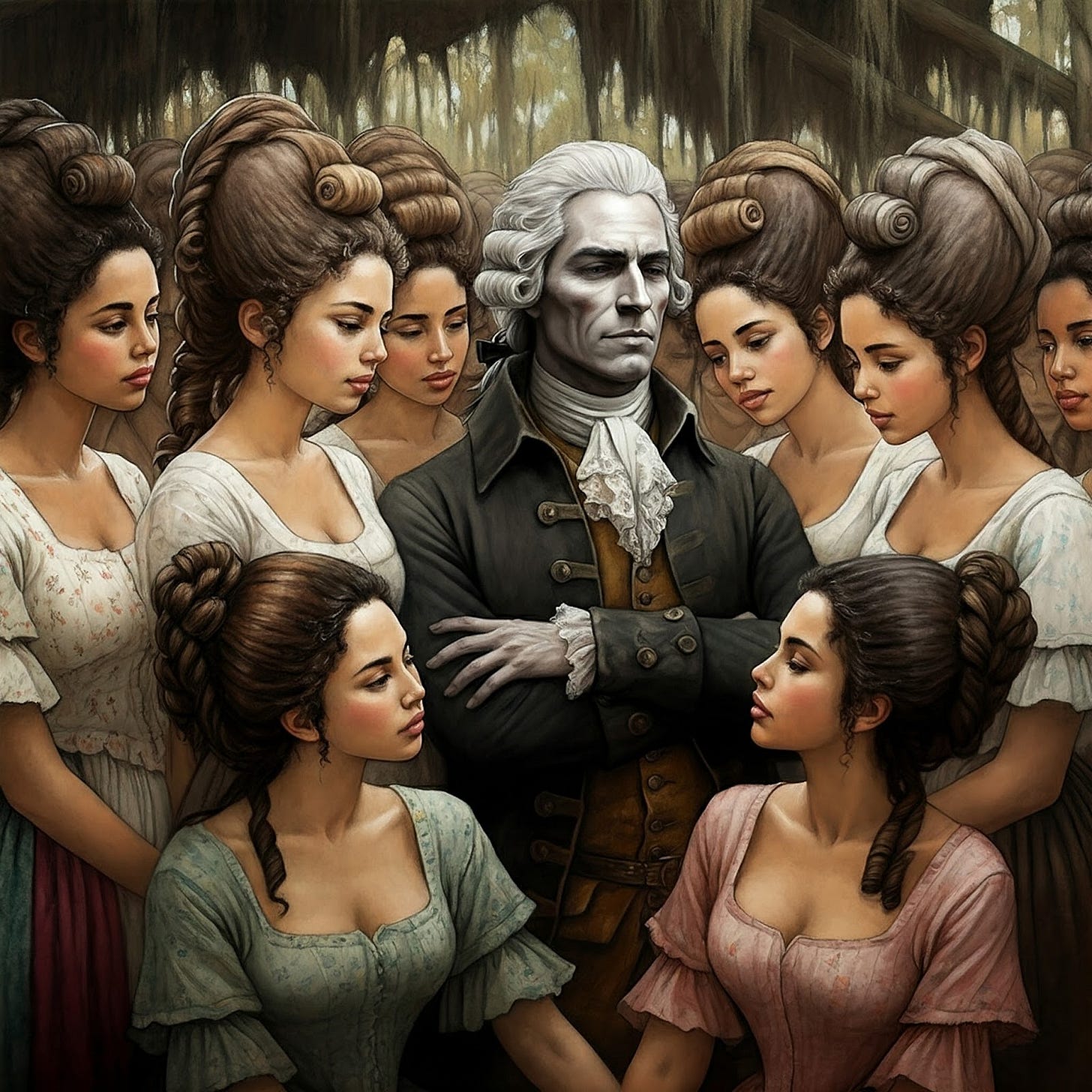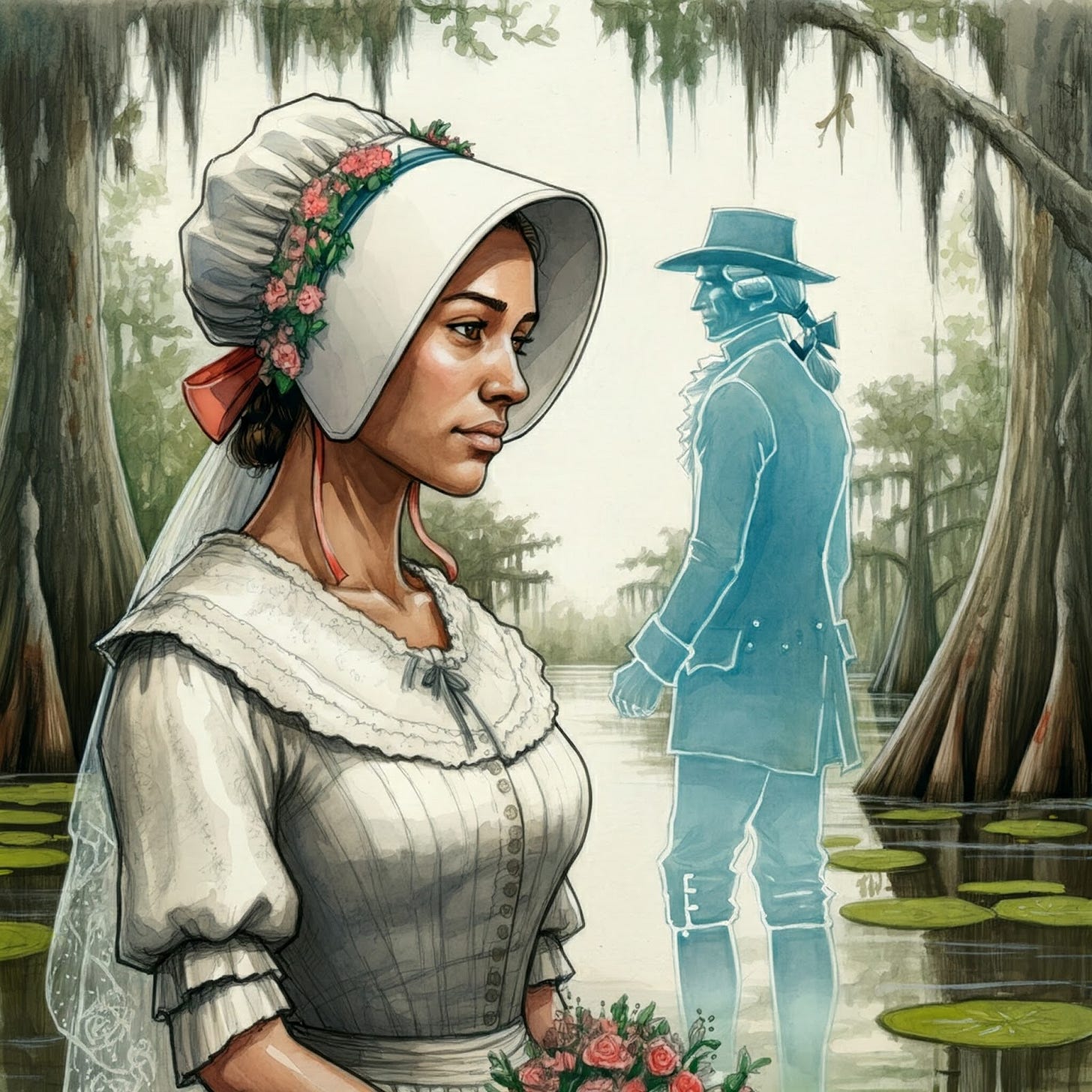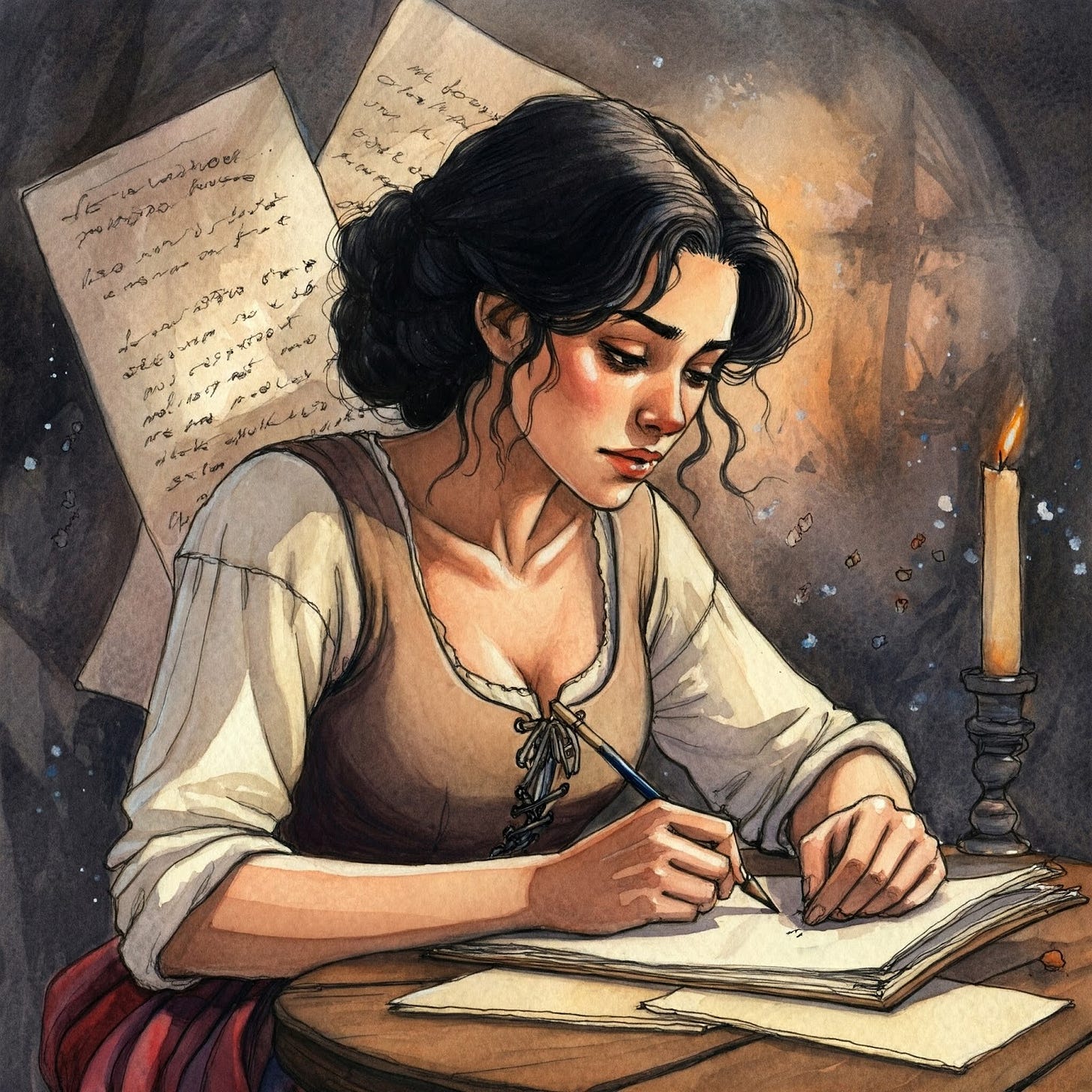HSHT 00021, Season 1
Dueling French Poems

As told by Emile Evariste Navarre - Writer/Editor for Cajun Chronicles
Many of the staff here at Cajun Chronicles Podcast Corporation have something lagniappe in common. If you go back in our family trees you’ll find that we are all related. You could almost say it’s a family affair for those of us whose roots go back to the early settlement of Louisiana. If we aren’t related by blood, marriage, or just plain guilty or related by association and shared experiences – We are also bound by the mysteries of romance that exists in Louisiana to this day.
In the sultry heart of Louisiana, where moss-draped oaks whisper secrets and the Mississippi River carries the echoes of a thousand loves. The question of which lover to favor – the fleeting passion of the moment or the enduring promise of forever looms? The echoes through the soul like a mournful jazz tune.
This land, steeped in a rich Creole and Cajun heritages, is a crucible of intense emotions, where love can bloom with the sudden ferocity of a summer storm and linger like the haunting aroma of sassafras.
Here, the lines between fleeting desire and enduring devotion blur. The choice between the ephemeral and the eternal becomes a poignant dance between the heart's wild impulses and the soul's deepest yearnings. Love’s complicated and often fickle.
Sitting here on the back porch dictating material for an upcoming Cajun Chronicles Podcast, I caught a whiff of the captivating spice combos of sassafras tea as my fellow writer/editor Nanette Malbreaux joined me. As a visually impaired person, certain aromas come with emotions – sassafras tea was my late wife, Hirma Mary’s favorite tea. We had seventy years of love and the one thing she loved was a certain family love poem.
In the Navarre family, our storytelling isn’t limited to oral traditions, art, and music. It's also found in love poems. One old French poem form our Acadian ancestors brought with them from France is that of French Jeu Parti. My wife’s favorite poem form proved to lend itself to telling romantic tales. Such poems always revolved around answering these questions:
Which lover should a woman favor?
One Who Is There For Just The Moment?
Or One Who Will Love Her Forever?

One of my great-grands has eloquently spoken out on our cultural dueling poems like this:
“Poetry has a lot of lovers, just like some of the myths that follow historic figures, especially in Cajun history. Down along Bayou Lafourche, Joseph Broussard (more famously known as Beausoleil) has been romanticized for generations. One example is the myth about Acadian Evangeline (Bellefontaine) popularized by Henry Wadsworth Longfellow’s epic poem, “Evangeline.”
For our ancestors who knew him, it was long held true that he was a fiddler, a passionate dancer. Of course, many hopelessly romantic tales and poems told about him were a staple of each bayou home with certain twists as they were recited again and again.
Hand-me-down love poems, love songs, and love stories are still important in preserving our cultural identity and heritage. One such love tale I heard was about how Jean Francois (Harvard) Navarre wooed his bride away from the famed seducer Beausoleil.
Quite a feat to accomplish when you consider that they had already been secretly married for 2 years before arriving in New Orleans on the ship, L’Amitie in 1785. Apparently, Jean Francois Navarre was competing with a Cajun Romeo ghost already dead 20 years before. So this is where myth happily meets reality in any good Cajun family story.Since some of our other ancestors who arrived first in the grand resettlement of our people knew and traveled with Beausoliel, tales persist of half-truths about this important historical figure and symbol of Acadian resilience, bravery, and cultural identity. Love poems, songs, and passion tales that are also filled with lore and myth.
Here’s my version of such a Jeu Parti poem based on my memory of the back porch stories Emile Evariste Navarre told of us of this romantic historical figure.”
Le Jugement dou Jean Francois Navarre et Beausoleil

Beausoleil
I beg of you Mademoiselle Marie Boudreau
To hear my plea and not bid me adieu.
Is it not nobler for me to love you, if only for but one petit jour,
Then to ask you to love me alone and the other suitor ignores you?
Come away with me, Beausoleil, before you show me the door.

Jean Francois Navarre
I too beg of you Mademoiselle Marie Boudreaux, my pretty fixed star
To hear my prayer and not to bid me au revoir
Is it not nobler for me to love you forever for who you are,
Then to abandon you to live among the New Orleans rookery poor?
Come away with me, Jean Francois Navarre, and show Beausoleil the door.
Beausoleil
I beg of you Mademoiselle Marie Bourdreaux
To let the memory of my kisses delight you forever,
And never from my heart sever
Then to not endure the life of a wife of a French pauper
Come away with me, Beausoleil, and talk to Jean Francois no more.
Jean Francois Navarre
With me at your Bayou home you will not go far
We’ll make a Lafourche home among our own.
Marry me and I, Jean Francois Navarre, will never roam
Will show you a love like ours time will never tear apart,
Beausoleil may be clever, but he won’t love you forever.
Beausoleil
I beg of you Mademoiselle Marie Boudreaux
It matters not that I cannot offer love forever.
Just one time with me will sustain your heart,
You’ll remember a love like ours time will never tear apart
A home Jean Francois may offer, but a heart greater than mine never.
Envoi sou Beausoleil
Run away with me beautiful Marie,
A love like ours time will never tear apart,
Just one time with me will sustain your heart.

Envoi sou Jean Francois Navarre
Marry me beautiful Marie
I, Jean Francois Navarre will never roam
We’ll make a Bayou home among our own.

Le Jugement dou Jean Francois Navarre et Beausoleil

Beausoleil
Je te supplie, Mademoiselle Marie Boudreau, D'écouter ma prière et de pas me dire adieu.
N'est-ce pas plus noble pour moi de t'aimer, ne serait-ce que pour un petit jour,
Que de te demander de m'aimer seule et que l'autre prétendant t'ignore?
Viens avec moi, Beausoleil, avant que tu me montres la porte.
Jean Francois Navarre
Moi aussi, je te supplie, Mademoiselle Marie Boudreau, ma jolie étoile fixe,
D'écouter ma prière et de ne pas me dire au revoir.
N'est-ce pas plus noble pour moi de t'aimer pour toujours pour qui tu es,
Que de t'abandonner à vivre parmi les pauvres de la Nouvelle-Orléans?
Viens avec moi, Jean Francois, et montre la porte à Beausoleil.
Beausoleil
Je te supplie, Mademoiselle Marie Boudreau, Que le souvenir de mes baisers te réjouisse à jamais,
Et ne te sépare jamais de mon cœur,
Que de ne pas endurer la vie d'épouse d'un pauvre Français.
Viens avec moi, Beausoleil, et ne parle plus à Jean Francois.
Jean Francois Navarre
Avec moi à ta maison sur le Bayou, tu n'iras pas loin.
Nous ferons un foyer en Lafourche parmi les nôtres.
Épouse-moi et moi, Jean Francois Navarre, je ne vagabonderez jamais.
Je te montrerai un amour comme le nôtre, le temps ne pourra jamais le séparer. Beausoleil peut être astucieux, mais il ne t'aimera pas pour toujours.
Beausoleil
Je te supplie, Mademoiselle Marie Boudreau, Peu importe que je ne puisse pas offrir un amour éternel.
Un seul moment avec moi suffira à soutenir ton cœur,
Tu te souviendras d'un amour comme le nôtre, le temps ne pourra jamais le séparer. Un foyer, Jean Francois peut l'offrir, mais un cœur plus grand que le mien, jamais.
Envoi sou Beausoleil
Fuis avec moi, belle Marie.
Un amour comme le nôtre, le temps ne pourra jamais le séparer.
Un seul moment avec moi suffira à soutenir ton cœur.
Envoi sou Jean Francois Navarre
Épouse-moi, belle Marie.
Moi, Jean Francois Navarre, je ne vagabonderez jamais.
Nous ferons un foyer sur le Bayou parmi les nôtres.
Note: If you are not familiar with an Envoi in poetry it’s a short stanza at the end of a poem. However, In this case it's two dueling Envoi’s.
In Louisiana, the art of storytelling through dueling Jeu poem forms woven through music, dance, and literature, remains deeply intertwined with the very fabric of our lives.. From the soulful melodies of Cajun and Zydeco music, where love stories are sung with raw emotion, to the vibrant Mardi Gras celebrations, where masks and revelry conceal and reveal passionate desires, the spirit of romantic expression thrives.
In this unique corner of the United States, dueling Old French love poems continue to find their voices, echoing through the swamps, the bayous, and the hearts of its people, a timeless celebration toast to the enduring power of human connection.

This tale is inspired by real New Orleans history, but some details have been spiced up for a good story. While we've respected the truth, a bit of creative license was used. Please note that all characters may be based on real people, but their identities in some cases have been Avatar masked for privacy.
A Word of Wisdom:
As you read, remember history and real life is a complex mix of joy, sorrow, triumph, and tragedy. While we've added a bit of fiction, the core message remains: the human spirit's power to endure, adapt, and overcome.
© Jerilee Wei 2024 All Rights Reserved.
PS: I have published parts of this original family oral poem previously on another site in 2023.













Share this post